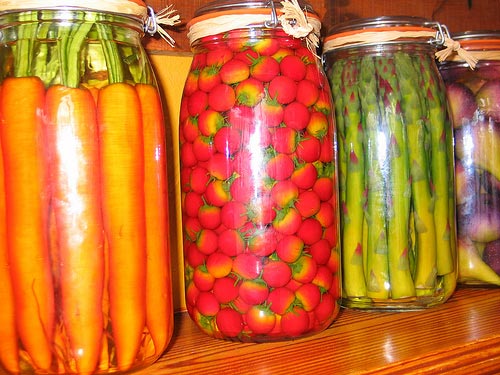The most astute point comes at the end of an AP wire story this morning about how various states are letting anyone sell anything  food-wise.
food-wise.
Ken Ruegsegger of New Glarus, Wis., bottles about 20 kinds of pickled fruits and vegetables such as peppers and carrots. He already invested in a commercial kitchen that meets licensing requirements and is charging $4 to $7 for his products to try to make back the money.
Unlicensed competitors can now make the same product in uninspected kitchens and sell it for half the price, he said.
"That could cost me thousands of dollars per year," he said. "And I’m inspected four times a year. These people could be making it in their kitchens with cats walking around. It’s not fair."
Why should people who play by the rules suddenly be penalized by letting anyone who makes some claim to local, natural or organic sell whatever they want for political expediency.
The story says that at Wisconsin farmers markets, vendors no longer need licenses to sell pickles, jams and other canned foods, while small farmers in Maine can sell slaughtered chickens without worrying about inspections.
Federal and state laws require that most food sold to the public be made in licensed facilities open to government inspectors. But as more people become interested in buying local food, a few states have created exemptions for amateur chefs who sell homemade goods at farmers markets and on small farms.
Robert Harrington, director of the Casper-Natrona County Health Department in Casper, Wyo., said,
"The two major failures in food production are temperature control and personal hygiene. If someone says they shouldn’t have to follow regulations because they’re making food in their home, I’d say, ‘Why is your home so safe that it doesn’t need that level of oversight and control?"
I’ll still go to the biggest supermarket I can find. And when I do shop at the market, vendors can expect a lot of microbiologically-based questions.
